Campus As A Living Lab
In our efforts to make UofL into a living laboratory of sustainability, the UofL Sustainability Council seeks researchers and faculty collaborators from all disciplines to work directly with us and to sponsor students (GRAs, interns, work-study, service learning, class projects, volunteers, etc.) to help us investigate ways to improve and enhance sustainability. If you want to get connected with other researchers or potential projects on campus, please contact the assistant to the provost for sustainability initiatives, Justin Mog.
UofL has many concrete sustainability research needs, including the following vital efforts that could be tackled through applied learning on campus:
- Metrics for Sustainability: Gathering and analyzing data about campus sustainability
- Greenhouse gas emissions accounting, offsetting and reduction strategies
- Socially-Responsible Investment strategies, policies, practices, and opportunities
- Renewable energy pilot projects (biofuels, solar, wind, geothermal, hydro) - design, siting, monitoring, etc.
- Effective communication strategies for behavior modification & culture change (e.g. recycling, commuting, food - local/healthy/less meat, smoke-free campus, on-campus energy/water conservation, etc.)
- Transportation choices, commuter behaviors, parking subsidies, and system improvements
- Human Resource management strategies for sustainability
- Green Purchasing: Product life-cycle analysis (ecological footprints)
- Sustainable Landscapes: Organic campus food gardens & orchards, landscape management, native landscaping, campus trees, wildlife habitat, ecological services, etc.
- Storm water management projects and monitoring (e.g. rain gardens, vegetated roofs, water catchment systems, infiltration systems, pervious pavement, etc.)
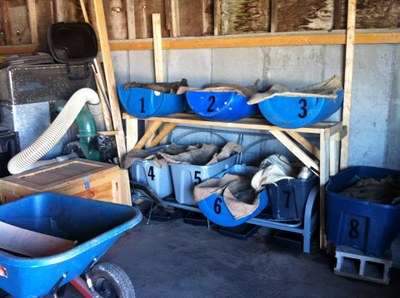 Community-scale composting and vermiculture
Community-scale composting and vermiculture- Consumer behavior studies around food choices, bottled water usage, waste production, and green purchasing
- UofL EcoReps - Sustainability training, leadership and advocacy strategies
- Campus Farmers Markets - Sustaining markets, engaging customers, supporting vendors, reaching the under-served, etc.
- Diversity & Affordability studies and support programs
- Model Green Room designs, monitoring, user-studies, educational tools, etc.
- Building Dashboards and Conservation Competitions as engagement and educational tools
- Community Engagement strategies for sustainability
- Computer management strategies for energy and resource conservation
- University Housing: Engaging and educating campus residents about sustainability
- Sustainability in Campus Master Planning and building design
- Curriculum development and interdisciplinary education strategies for sustainability
- Waste Reduction strategies and systems
To learn more about how to integrate Campus As A Living Lab projects into your courses, consult AASHE's Guide for Applied Sustainability Learning Projects: Advancing sustainability outcomes on campus and in the community, which provides a step-by-step framework for how applied learning for sustainability programs can be designed, built and scaled around two interconnected goals:
- Provide students with exceptional learning experiences in sustainability;
- Contribute to workable solutions that support tangible sustainability outcomes on campus and the surrounding community.
The publication brings together lessons from on-the-ground management of applied learning for sustainability programs across the U.S. and Canada with literature related to sustainability science, sustainability pedagogy, change management and partnership development.
School yard becomes latest urban laboratory in Louisville (UofL News, May 19, 2016)
Examples of Campus as a Living Lab projects at UofL
-
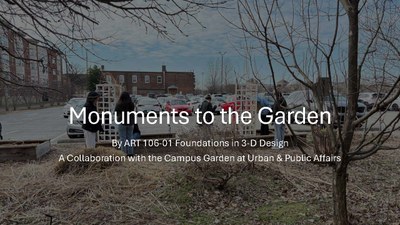 Spring 2025: Land Art at Campus Gardens
Spring 2025: Land Art at Campus Gardens
Fine Art Graduate Assistant, Sarah Jane Castellon, collaborated with the UofL Sustainability Council to engage students in her ART 106-01 LAB - Foundation 3-D Design class in UofL’s Campus Gardens. The class took two days in late February 2025 to clean up the Urban & Public Affairs Garden and use the materials collected to design biodegradable land art pieces on durable trellis structures that will serve the garden for years to come. -
Spring 2025: Campus Walk Audit
Health and Sport Sciences Professor Kristi King had students in her HSS 504: Physical Activity and Public Healthcourse conduct a Walk Audit using AARP Walk Audit worksheets up the east side of 4thStreet from Central Ave to Cardinal Blvd on April 8th. The AARP Walk Audit Tool Kit provides information about reporting results and proposing solutions to local leaders, elected officials and members of civic organizations and neighborhood groups.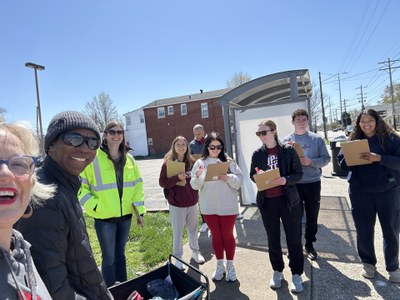 On June 4, 2025, Professor King presented her walk audit research nationally at the Coalition of Urban and Metropolitan Universities (CUMU) 2025 Anchor Learning Network Action Summit: Thriving Neighborhoods.
On June 4, 2025, Professor King presented her walk audit research nationally at the Coalition of Urban and Metropolitan Universities (CUMU) 2025 Anchor Learning Network Action Summit: Thriving Neighborhoods. -
Fall 2024 - Spring 2025: Planning for a Bottled Water Phase Out
In response to a request from President Schatzel to develop a plan for phasing out bottled water on campus, the UofL Sustainability Council sought input from a wide variety of stakeholders and collaboration from faculty and their students. Marketing professor Henrietta Pepper was already in conversation with the Louisville Water Company about developing an applied learning opportunity for students in her MKT 460 Integrative Marketing Strategies class, so it was a natural fit to focus the projects on this proposal. Throughout the semester, the students worked in small teams to developed white papers and oral presentation proposals for UofL and the Louisville Water Company based upon survey data (of students in Fall 2024 and of faculty/staff in Spring 2025) and their own observations and research about what other universities have done to phase out bottled water and other single-use disposable plastics. Students presented their recommendations to the clients on November 20, 2024 and April 21, 2025.
-
Spring 2024 & 2025: Car-Free Guide for UofL
Over the spring 2024 and 2025 semesters, Professor Tim Darst invited UofL's Sustainability Coordinator, Dr. Justin Mog, to mentor students in his HON 341-06 Sustainable Transportation class. The students were assigned a final group project to design and deliver a product to help increase use of more sustainable transportation options by the UofL population. The students decided that getting information to incoming students about more sustainable transportation options would be an impactful approach. The 2024 students designed and created a handy Car-free Guide for UofL, and had printed for summer orientation hundreds of associated pamphlets and stickers with QR codes pointing to the online guide. The 2025 students organized an end-of-year event to encourage students to explore car-free modes: TARC to the Park! took place on April 21st, 4pm at Central Park. -
2022-24: Bird Safe Campus Studies
After being approached by the Olmsted Parks Conservancy and other partners pulling together to make Louisville part of the Urban Bird Treaty program of the U.S. Fish and Wildlife Service, the UofL Sustainability Council convened a work-group of faculty, staff, students, and community members interested in addressing the issue of bird-window strikes on campus and devising recommendations for making UofL more bird-friendly.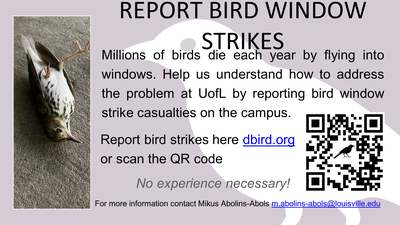 Data-gathering began in fall 2022 with a citizen science effort using the dBird online platform to get the campus community engaged in documenting dead birds on campus in order to begin prioritizing dangerous buildings for intervention. This culminated in a March 2023 EcoReps Lunch & Learn Workshop on Bird-Friendly Cities & Campus (video) to share the initial data and encourage more participation in future research. In fall 2023, Biology professors, Mikus Abolins-Abols and Rachel Pigg led a 5-student independent study on bird window collisions on campus. The work-group then decided to apply for funding to hire future student researchers through the 2023-2024 Mutual of Omaha’s Wild Kingdom College and University Grant Program.
Data-gathering began in fall 2022 with a citizen science effort using the dBird online platform to get the campus community engaged in documenting dead birds on campus in order to begin prioritizing dangerous buildings for intervention. This culminated in a March 2023 EcoReps Lunch & Learn Workshop on Bird-Friendly Cities & Campus (video) to share the initial data and encourage more participation in future research. In fall 2023, Biology professors, Mikus Abolins-Abols and Rachel Pigg led a 5-student independent study on bird window collisions on campus. The work-group then decided to apply for funding to hire future student researchers through the 2023-2024 Mutual of Omaha’s Wild Kingdom College and University Grant Program.
-
Fall semesters 2023-25: Managing Invasive Species
Every Fall semester, starting in 2023, professor Tim Darst engages his students in an HON 341-04 Urban Ecology class in learning about the threats posed by invasive plant species by turning the focus to the edges of UofL's main Belknap campus, where invasive plant species have begun to invade. Tim works with Physical Plant's grounds keeping staff to identify a good location to study the challenges of managing invasive plants and they collaborate on a service project to give the class hands-on experience with removing invasive species from the Hughes Lot and Community Composting Project along Floyd Street between Bloom and Lee Streets and along Lee Street from Floyd to the railroad. The students gain the opportunity to learn about invasive species management in a real-world urban context and, with the influx of additional labor, the over-stretched grounds keeping staff has the opportunity to finally address a neglected area of campus, and to do so without the use of herbicides.
-
2023: Mapping UofL Stormwater Management Systems
Student interns with UofL's Center for GIS in the Department of Environmental and Geographic Sciences worked with UofL staff in Physical Plant and Environmental Health & Safety to identify, map, and tell the full story of the university's extensive efforts to capture and infiltrate stormwater on campus. They created both a publicly-facing story map to better educate the community about the invisible systems below their feet, but also a mobile app to simplify and digitize the fieldwork of maintenance staff as we fulfill our regulatory obligations in reporting to the Metropolitan Sewer District. This work not only pulls together the rich story of our work on campus, but saves staff time and effort going forward. -
F
 all 2022: UofL & Beargrass Thunder researching the impact of alley revitalization on mental wellbeing
all 2022: UofL & Beargrass Thunder researching the impact of alley revitalization on mental wellbeing
The UofL Center for Healthy Air, Water and Soil has partnered with the local sustainability-focused group Beargrass Thunder and the UofL Health Equity Innovation Hub to clean up a local alley and assess the impact of the change on residents’ mental wellbeing. Volunteers, including UofL students and staff, cleaned up alley space along Oak Street of trash and overgrown invasive plants and added flowers, art and low-level lighting to create pleasant green space. To document the impact of improving green spaces, UofL researchers conducted online surveys of area residents before the cleanup to assess their mental wellbeing and distress. In a year, they will survey the residents again to find out how having more nature near their homes affects their mental wellbeing. “This is another way to assess the varied impacts ‘nearby nature’ can have. If gains in physical and mental health can be made through projects like this, it can inform city leaders and policy decisions around urban spaces,” said Jody Dahmer of Beargrass Thunder, who is leading the revitalization project.
-
Summer 2022: Downtown Walkability Empathic Design Study
In July 2022, UofL's Urban Design Studio worked with Dr. Aqlan of UofL's Speed School of Engineering and a group of student interns on a study to try to identify pedestrian stress hotspots downtown, adjacent to UofL's Health Sciences Center. Volunteers were soliticted to assist in collecting data for the walkability empathic design study. The study employed software, in collaboration with Gresham Smith, to anonymously record the stress levels of pedestrian participants as they walk around downtown. This data was gathered to identify the most stressful crossings, blocks, and other locations to understand if there is something about the design of those areas that is contributing to the stress to inform future improvements to the streetscape. The study involved three one-hour walks a day (9:30 am, 11:30 am, and 3 pm) along predetermined routes fromn July 11-14, 2022. -
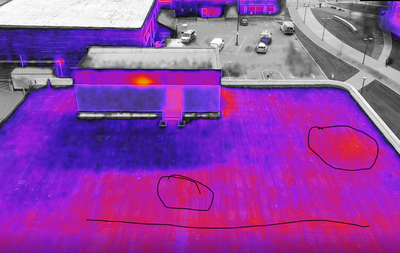 Winter 2021-22 Thermal Imaging Project: At the request of Physical Plant and the UofL Sustainability Council, Geography faculty, DJ Biddle (Director of the Center for GIS) and Forrest Stevens, used the department's drone-mounted thermal imaging equipment to conduct a before-and-after thermography study of the impact of a re-roofing and insulating project on the Houchens Building. This work makes the unseen visible and helps document the value of investing in energy efficiency and deferred maintenance projects.
Winter 2021-22 Thermal Imaging Project: At the request of Physical Plant and the UofL Sustainability Council, Geography faculty, DJ Biddle (Director of the Center for GIS) and Forrest Stevens, used the department's drone-mounted thermal imaging equipment to conduct a before-and-after thermography study of the impact of a re-roofing and insulating project on the Houchens Building. This work makes the unseen visible and helps document the value of investing in energy efficiency and deferred maintenance projects.
-
2021-22:
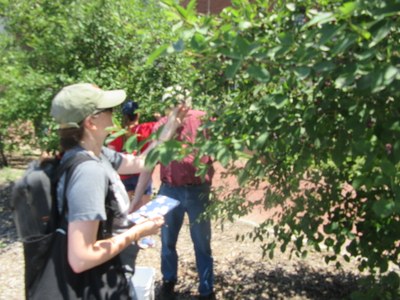 Campus Sustainability, Community Context: Engaged Anthropology to Advance Stewardship
Campus Sustainability, Community Context: Engaged Anthropology to Advance Stewardship
Dr. Angela Storey, Department of Anthropology & Engaged Ethnography Lab, oversaw a team of undergraduate and graduate campus as a living lab social science researchers within the context of a course entitled ANTH 475 Engaged Anthropology. This engaged ethnographic research is being conducted with, and about, UofL campus sustainability efforts, focusing on projects with significant student participation. Conceptually, the work is framed by interdisciplinary scholarship in Urban Political Ecology that seeks to understand environmental work within the context of relationships of power experienced across scales from the local to the global (cf. Checker 2005; Rademacher 2015; M’Gonigle & Starke 2006). This theoretical frame prompts us to explore questions of responsibility, engagement, efficacy, and outcome, and to embed these questions within an understanding of how sustainability programs work at UofL and across university campuses in the U.S. and internationally at a time of ecological crisis. The objective is to better understand the relationship between students, staff, administrators, and faculty within sustainability initiatives at UofL. This research will examine the engagement, efficacy, and impact of campus actors within various programs. Learn more about the project. -
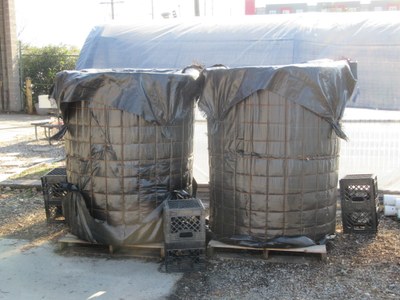 2020-21: Experimenting with Johnson-Su Composting Bioreactors and liquid application on campus turf
2020-21: Experimenting with Johnson-Su Composting Bioreactors and liquid application on campus turf
UofL Groundskeeper Ryan Lewis is collaborating with undergraduate Composting Intern, Josh Cagle, to experiment with the Johnson-Su Composting Bioreactor design prototyped by researchers at New Mexico State University. They are constructing six bioreactors on campus to explore more efficient methods for composting leaves in the fall using this passive, no-turn system that produces a superior, microbially-diverse and fungal-dominant compost. This compost can be used to restore biological functionality to soils, so we will be examining the soil quality impacts of applying the liquid organic compost products on grass turf at Belknap campus. The idea is to study the impacts on factors such as soil bulk density and fertility of switching from chemical fertilizer to compost as a pilot project on an out-of-the-way lawn suffering from soil compaction. If the project proves successful, the Grounds crew will consider expanding the practice to other areas of campus in order to improve soil quality, reduce nitrogen pollution and save money by moving away from chemical fertilizers.
-
Fall 2020: UofL students invent new test for water pollution
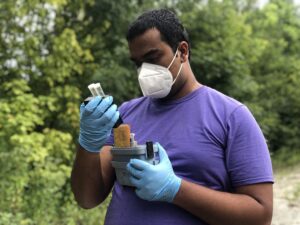 A team of UofL undergraduate students invented a new tool for monitoring E.coli bacteria in water sources that is more efficient and cost effective. The students, led by junior applied geography (environmental analysis track) major and Grawemeyer Scholar Sam Kessler, invented the tool during a service project with Metropolitan Sewer District, Bernheim Forest and The Nature Conservancy. They volunteered to help monitor, clean up and restore streams in Louisville, including testing them for E.coli bacteria, which is found in biological waste and can sometimes cause disease. But, the team would have to consistently travel to each site — 10 sites across three different watersheds — at least five times per month to keep pace with the minimum testing required by the Environmental Protection Agency and Kentucky Department for Environmental Protection. “With our class schedules, going to each of those sites multiple times per month wasn’t going to work for very long,” Kessler said. “We were traveling to some of these sites four times per week in between classes – Beargrass Creek, Bernheim Forest and all over. We needed something more efficient.” To solve that problem, Kessler said, they invented a now patent-pending tool made from PVC pipe containing a special type of sediment material in mesh bags that can be left in the stream and read just once per month. Kessler believes their tool could dramatically improve the time and cost efficiency of testing. Read more.
A team of UofL undergraduate students invented a new tool for monitoring E.coli bacteria in water sources that is more efficient and cost effective. The students, led by junior applied geography (environmental analysis track) major and Grawemeyer Scholar Sam Kessler, invented the tool during a service project with Metropolitan Sewer District, Bernheim Forest and The Nature Conservancy. They volunteered to help monitor, clean up and restore streams in Louisville, including testing them for E.coli bacteria, which is found in biological waste and can sometimes cause disease. But, the team would have to consistently travel to each site — 10 sites across three different watersheds — at least five times per month to keep pace with the minimum testing required by the Environmental Protection Agency and Kentucky Department for Environmental Protection. “With our class schedules, going to each of those sites multiple times per month wasn’t going to work for very long,” Kessler said. “We were traveling to some of these sites four times per week in between classes – Beargrass Creek, Bernheim Forest and all over. We needed something more efficient.” To solve that problem, Kessler said, they invented a now patent-pending tool made from PVC pipe containing a special type of sediment material in mesh bags that can be left in the stream and read just once per month. Kessler believes their tool could dramatically improve the time and cost efficiency of testing. Read more.
-
Fall 2019: Marketing students take on Sustainability Council as a client
After participating in the Green Threads Faculty Workshop, College of Business professor Katina Kulow decided to engage students in her MKT 301 Honors Principles of Marketing class in exploring some of the Sustainability Council's marketing challenges. The class took on the UofL Sustainability Council as a marketing client for the semester and four student teams produced recommendations for marketing: Ecolympics, increasing TARC ridership among students (2 groups chose this), and promoting a more plant-based diet among UofL students. -
2019: Recycling Bin Hackathon
The newly formed HSC Green Team teamed up with the UofL Sustainability Council and GE's FirstBuild micro-factory and makerspace on campus to get students, staff, faculty, and friends of UofL involved in a series of collaborative, hands-on, co-creative workshops to rethink and redesign the recycling experience on campus. Interdisciplinary teams were tasked with generating and then building waste stations that would flip the script in users' minds and make it easy, fun, and informative to recycle plastic, paper, glass, cardboard, and metal. The goal was to dramatically increase recycling rates to well over 50% while educating and engaging campus users about what can be recycled and why solid waste is such a problem. Teams also tackled common challenges on campus like stacks of pizza boxes or waste from boxed lunches that don't fit in current bins and increase costs for the university which pays for recycling by volume, rather than weight. Staff from FirstBuild facilitated a series of two-hour hackathons that drew up to 20 participants for the final event on April 3rd which produced several prototype designs that will be deployed on campus to gather data about their impact, serviceability, and user-friendliness. In Fall 2019, Art Professor, Leslie Friesen’s ART590 “Design for Public Issues” class (see below) adopted the team as a client to develop a comprehensive graphic design campaign for informational and motivational signage for UofL's single-stream recycling program.
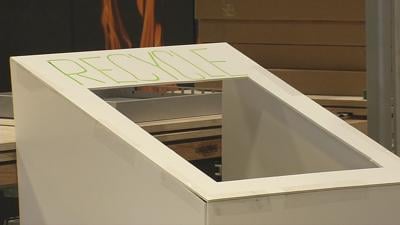 UofL students and staff create prototype to encourage more recycling (WDRB, April 3, 2019)
UofL students and staff create prototype to encourage more recycling (WDRB, April 3, 2019)
UofL works with First Build to create new recycling bins (WAVE 3, April 3, 2019)
-
2018-2019: UofL students digging up the dirt on bacteria in soil
UofL students are conducting research on bacteria in campus soils to determine what bacteria can be used as a self-renewing fertilizer. Biology professor Paul Himes is leading this research study in hopes of renewing damaged soil in polluted areas. Determining what bacteria is the most beneficial could lead to the rejuvenation of soil and the possibility of plants being able to grow there once again. “Where there is nothing growing, we can turn this soil that’s not useful into something that we can use for crops,” Himes said. Himes’ students, who are undergraduates, have dug up soil samples from a plot on university property where hemp and kenaf plants are growing. The samples are then taken to a lab to see if they can determine which helpful bacteria might grow under certain conditions. The research could prove to be an economic boon. “We can make use of land that is right now not useable and hopefully that can be an economic boost for the state” Himes said.
-
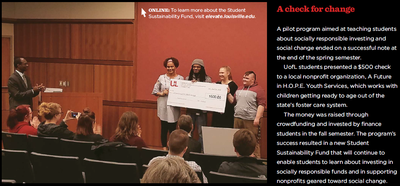 On-going: Student-Managed Socially-Responsible Investment Fund
On-going: Student-Managed Socially-Responsible Investment FundBeginning in 2017-18, UofL piloted a new full-circle, Student Sustainability Fund through which students in a fall Finance class learn about and gain real-world experience with Socially-Responsible Investing during the fall semester; and then, in the spring semester, students in a Social Change class learn about and gain real-world experience with Student Philanthropy to support local projects and organizations working to implement sustainability. On April 6, 2018, UofL launched an Arbor Day to Earth Day crowdfunding campaign to create the new Student Sustainability Fund. From April 6-22, 2018, friends of UofL were encouraged to help us unlock a donor match: When we raise $5,000 for the Student Sustainability Fund, Just Money Advisors, a Louisville-based company, pledged to give $5,000 towards the fund! Gifts of all sizes helped unlock this matching gift. By supporting the Student Sustainability Fund you are investing in high-value, hands-on education for 21st century social responsibility. The SSF is a unique fund, separate from the rest of the endowment, which uses the fund itself as a pedagogical tool. First, Finance students in the College of Business do some real-world socially responsible investing by selecting funds, investing real dollars, managing the fund, and voting their proxies. All investments and proxy votes will be researched and selected by students, subject to the university’s sustainable investments policy. Then, Social Change students in the College of Arts & Sciences will use the proceeds to fund local nonprofit or philanthropic projects either on or off campus. They research local nonprofits and allocate funds in a way that builds capacity or enhances sustainability. Thus the Student Sustainability Fund puts donors’ resources directly to work for educational enrichment and social change. Donate today!
-
2016-2018: Hemp & Kenaf Fuel Crops
 Someday, a 3-D printed medical implant made from hemp oil may save your life, or a hemp-based biofuel may power your vehicle. Those are just the tip of the iceberg of possible outcomes of work being done at the University of Louisville’s Conn Center for Renewable Energy Research, where students and staff grew “energy crops” planted near the J.B. Speed School of Engineering. 2017 marked the second year that hemp and kenaf, an African fiber plant, were planted near Phoenix House, the Conn Center’s solar-powered administrative office building. The plants were an unusual site along the Eastern Parkway overpass, where they were sown in May and were the background of many a selfie. The plants, both highly suitable to Kentucky’s growing conditions, are part of the Conn Center’s research into biofuels and biomass conversions. The UofL crop was one of eight at Kentucky colleges and universities grown as part of the state’s pilot program into field-scale industrial hemp, but the only one that will be used for energy research.
Someday, a 3-D printed medical implant made from hemp oil may save your life, or a hemp-based biofuel may power your vehicle. Those are just the tip of the iceberg of possible outcomes of work being done at the University of Louisville’s Conn Center for Renewable Energy Research, where students and staff grew “energy crops” planted near the J.B. Speed School of Engineering. 2017 marked the second year that hemp and kenaf, an African fiber plant, were planted near Phoenix House, the Conn Center’s solar-powered administrative office building. The plants were an unusual site along the Eastern Parkway overpass, where they were sown in May and were the background of many a selfie. The plants, both highly suitable to Kentucky’s growing conditions, are part of the Conn Center’s research into biofuels and biomass conversions. The UofL crop was one of eight at Kentucky colleges and universities grown as part of the state’s pilot program into field-scale industrial hemp, but the only one that will be used for energy research.
Industrial hemp is a variety of Cannabis sativa and is of the same plant species of marijuana. However it doesn’t contain high levels of THC, the psychoactive chemical found in marijuana that causes the marijuana high. Both hemp and marijuana are classified as Schedule 1 drugs under the Controlled Substances Act, and are illegal to produce in the United States. In Kentucky, only those who are part of a Department of Agriculture research program into field-scale industrial hemp production may grow hemp. More than 3,200 acres of industrial hemp was grown in Kentucky in 2017, the department said.
The UofL crop expanded in 2017 to a total area of just over one tenth of an acre, said Andrew Marsh, assistant director of the Conn Center. Marsh planted the seeds in three plantings beginning in May. He had help from groundskeepers from Physical Plant and researchers from the University of Kentucky’s industrial hemp program. After cutting down the plants, Marsh and students bundled and transported them to the Conn Center’s Science & Innovation Garage for Manufacturing Advancement, where they will dry. “Once dried, the Conn Center’s Biofuels & Biomass Conversion group, led by Jagannadh Satyavolu, and faculty from chemical engineering, such as Noppadon Sathitsuksanoh, will work with the biomass,” Marsh said. Marsh said the center plans to expand the crop in 2018 and hopes to improve soil quality to ensure the plants do well in their urban environment.
“In 2016 and 2017, the tendencies of different seed types to prosper in our climate and soil conditions over those that do not have become apparent,” Marsh said. “So far, we have been growing in unconditioned ‘urban clay,’ not farm soils. This year gave a better look at the nutrient deficiencies, so 2018 will include soil-conditioning strategies. There are hemp varieties that we grew that just didn’t do very well with our mix of soil, available nutrient and water, but others did great. We’ll be diversifying our seed types next year too, looking for greater yield with minimal soil modifications. This was our first full season of growing, and the results are pretty good for both kenaf and hemp.” The state’s hemp research program is looking into whether hemp can once again become an economic driver in the state, where it was once grown primarily for making rope. Satyavolu, the center’s leader for biofuels and biomass conversion, along with assistant chemical engineering professor Sathitsuksanoh and students, are studying whether hurd, the innor core of the hemp plant stem, has potential for use in fuels, chemicals and polymers. Hurd is a byproduct after the outer fibers of the hemp are removed.
The Conn Center research is specifically focused on: 1. Converting hemp into high value, functionalized carbons that can be used as catalyst supports and energy storage media; 2. Transforming hemp seed oil into biocompatible resins for 3-D printed medical implants, and 3. Extracting sugars from hemp to convert into diesel additives and other chemicals.
In collaboration with the state, UofL established the Conn Center for Renewable Energy Research at the J.B. Speed School of Engineering in 2009. The center leads research that increases homegrown energy sources to meet the national need while reducing energy consumption and dependence on foreign oil. The center promotes partnerships among Kentucky’s colleges and universities, private industries and non-profit organizations to actively pursue federally and privately funded R&D resources dedicated to renewable energy solutions. Researchers at the Conn Center are studying advanced energy materials manufacturing; solar energy conversion; renewable energy storage; biofuels/biomass conversions; and energy efficiency and conservation.
Sources: UofL’s ‘energy crops’ harvested for research (UofL News, Nov. 1, 2017)
Conn Center plants industrial hemp in quest for renewable energy (UofL News, May 18, 2017)
UofL’s Conn Center exploring industrial hemp (UofL News, Aug. 23, 2016) -
Spring 2017: Public Health Practice - Smoke-Free Campus
When UofL was designated as a Smoke-free Campus in 2010, it was an exciting opportunity to enhance campus air quality, improve public health, and contribute to a culture of health and wellness on campus. Six years later, many of the original smoke-free signs had disappeared and, as a result, the original intent of the policy had been diminished. Public Health majors in professor, David Johnson's spring course, PHUN 420 Public Health Practice, have been charged with the tasks of mapping the current state of the smoke-free signage and occurrences of smoking and vaping on campus. As both students and future public health professionals, they were asked to present their findings in a report and make recommendations for new and/or improved signage. The course not only used the campus as a living lab, but it responded directly to concerns about the erosion of our Smoke-Free culture that were raised by students, the Office of Health Promotion and the UofL Sustainability Council. Students were tasked with assessing the state of our Smoke-Free Campus initiative on Belknap campus. Small groups of students were assigned areas of the campus to survey, looking for the presence or absence of Smoke-Free signage, outdated legacy smoking area signage that still needs to be removed, and areas of concentrated smoking behavior. The students then compiled a set of recommendations that were submitted to the Sustainability Council's Operations committee on February 21, 2017 and approved for final submission to the administration. The students' investigation and recommendations were extremely helpful for moving us forward and data gathering has continued through the class each spring.
AUDIO: UofL Masters of Urban Planning Capstone Students, Danielle Story & Elizabeth Frank on Transit-Oriented Development (Sustainability Now!, FORward Radio, Dec. 11, 2017)
-
Spring 2017: Urban Planning students explore ideas to improve Louisville’s sustainability score
As the capstone to a semester of work, UofL Urban Planning grad students were tasked with helping the city of Louisville improve its 4-star rating in the STAR Community Rating System, which measures sustainability. Louisville’s areas needing improvement in this system are easy transportation or walkability to workplaces and availability of affordable housing across the city. The students took a look at ways Louisville could improve its sustainability score by better matching public transportation to jobs and housing and improving walkability and infrastructure. Students approached this task by mapping out likely areas for transit oriented development or TODs. Check out more about their research below:
Sources: Video: Urban Planning Students' ideas to improve Louisville (WHAS-TV Great Day Live, July 31, 2017)
Urban Planning students pitch ideas to improve Louisville’s sustainability score (UofL News, Aug. 1, 2017) -
 On-going: Design for Public Issues
On-going: Design for Public Issues
Each year, Art Professor, Leslie Friesen’s ART590 “Design for Public Issues” class is tasked with researching the needs of a local non-profit organization and developing design concepts that would assist in achieving that mission. Since 2010, the course has served as a culminating, service learning experience for BFA students in the Graphic Design program, where they can apply all they’ve learned in their prior two years of classes. Students work as a team with a nonprofit to develop materials that effectively communicate the organization’s message and provide a strong, cohesive visual identity. According to Friesen, “the overall goal is to increase awareness, involvement and support for these nonprofits.” Organizations selected have limited resources and couldn’t otherwise afford the work.
> In Spring 2012, the UofL Sustainability Council was the client for the class which created a full suite of design concepts for awareness-raising and behavior change around three themes: Energy/Water Conservation; Transportation Alternatives; and Local and Sustainable Food.
> In Fall 2016, the client for the course was the Louisville Climate Action Network (LCAN). Friesen calculates that a private agency would likely have charged LCAN as much as $200,000 for the the number of hours that the team of 13 students put into the project. “This is the huge advantage of having a metropolitan research university in this city – the focus on service. Students and faculty take the education process and apply it to the needs of the community as they’ve done here,” said Barry Zalph, an LCAN board member.
> In Fall 2017, students in the course produced a complete design suite for Louisville's new grassroots community radio station, FORward Radio WFMP-LP 106.5fm. The station launched in April 2017 as a media project of the Louisville Chapter of the international peace and justice organization, the Fellowship of Reconciliation (FOR). Several UofL faculty, staff, and students can be heard on the station's airwaves covering a wide range of social justice, environmental, and sustainability topics. The station was in need of a logo and design guidance for its website, social media platforms, signage, and printed materials, but as a low-budget, listener-supported entity, could not have afforded the many hours of professional design services provided by students in the course.
Designed to serve: How a Hite Art Institute class helps area nonprofits (UofL News, Dec. 15, 2016).
> In Fall 2019, students in the course took on as a client UofL's Health Sciences Center Green Team and the UofL Sustainability Council to develop a comprehensive graphic design campaign for informational and motivational signage for UofL's single-stream recycling program. This work was inspired by the 2019 Recycling Bin Hackathon with FirstBuild.
-
On-going: Maple Tapping on Campus
Each winter in the early spring semester, students, faculty, staff, and community partners participate in tapping trees on campus to make syrup and learn about the process and the evolving climatic and biological factors involved in a successful enterprise. It all began in Spring 2016, when non-science-major students in new Sustainable Community Engagement sections of BIOL 104 - Laboratory for Introduction to Biological Systems experimented with tapping trees on Belknap campus to gather sap for syrup, learn about the process, and study the environmental conditions that influence it. UofL's maple trees on campus had never been tapped before, so students, faculty and staff were involved in learning about this new urban agroforestry resource on campus.
In 2024, the project marked its ninth year by kicking off our spring Garden Commons workshop series with a Maple Tapping Workshop on February 2nd, that attracted a record number of participants over 30), including many members of the general public and UofL's Urban Agriculture class. See photos and videos. See map of tapped trees and collection barrels. Our workshop leader, Dave Barker, also tapped dozens of trees at UofL's Shelby Campus on January 1st and invited the whole campus community out to his Urban Ducks Farm in Lyndon for a sap boil on Kentucky Maple Day, February 3rd. Again, the entire campus community was invited to sample the 2024 syrup at the April 19th EcoReps Lunch & Learn Workshop: UofL Maple Syrup & Honey Pancake Party! University of Louisville students collecting maple syrup (Spectrum News, March 1, 2024)
University of Louisville students collecting maple syrup (Spectrum News, March 1, 2024) UofL begins maple syrup harvest using campus trees (UofL News, Feb. 13, 2024). See also The Lane Report (Feb. 14, 2024)
UofL begins maple syrup harvest using campus trees (UofL News, Feb. 13, 2024). See also The Lane Report (Feb. 14, 2024)
In 2023, the project continued with a Garden Commons Maple Tapping Workshop on January 19th (see Photos & Videos.). With the continued help of our community partner, Dave Barker (who also tapped dozens of trees at UofL's Shelby Campus), the project was run by Garden Commons interns and volunteers, who installed 14 taps on a variety of maple trees around the College of Education, Baptist Campus Ministry, Gottschalk, and Grawemeyer Halls. For the first time, in 2023 we participated in Kentucky Maple Day 2023 and invited everyone to a Sugar Shack Open House (Making Maple Syrup with UofL Sap)In 2022, the project kicked-off with a Garden Commons Maple Tapping Workshop on January 14th (see Video. Photos.). With the continued help of our community partner, Dave Barker (who also tapped dozens of trees at UofL's Shelby Campus), the project was run by Garden Commons interns and volunteers, who installed 14 taps on a variety of maple trees (including a few new ones) around the College of Education, Baptist Campus Ministry, Gottschalk, and Grawemeyer Halls. The entire campus community was invited to sample the 2022 syrup at the April 22nd EcoReps Earth Day Lunch & Learn: UofL Maple Syrup Pancake Party & Climate Strike.on Saturday, Feb 4th, 12-6pm at Dave Barker's Urban Ducks Farm next to UofL's Shelby campus (9011 Old Whipps Mill Rd). Again, the entire campus community was invited to sample the 2023 syrup at the April 21st EcoReps Lunch & Learn Workshop & UofL Maple Syrup Pancake Party!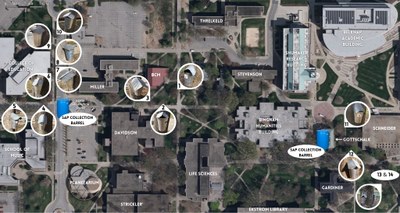 In 2021, the project was run by Garden Commons interns and volunteers who installed 14 taps on a variety of maple trees around the College of Education, Baptist Campus Ministry, Gottschalk, and Grawemeyer Halls at a January 15th Maple Tapping Workshop (watch video. see photos.workshop video). 90 trees at UofL's ShelbyHurst Campus were also tapped again in 2021. In the midst of the productive season, everyone was invited to learn more about the process while enjoying the early fruits of the 2021 season at a February 6th Sugar Shack Open House (Making Maple Syrup w/UofL Sap), out at Urban Ducks Farm next to UofL's ShelbyHurst Campus (see photos). The entire campus community was invited to sample the 2021 syrup at the April 16th EcoReps Lunch & Learn: UofL Maple Tapping & Pancake Party!
In 2021, the project was run by Garden Commons interns and volunteers who installed 14 taps on a variety of maple trees around the College of Education, Baptist Campus Ministry, Gottschalk, and Grawemeyer Halls at a January 15th Maple Tapping Workshop (watch video. see photos.workshop video). 90 trees at UofL's ShelbyHurst Campus were also tapped again in 2021. In the midst of the productive season, everyone was invited to learn more about the process while enjoying the early fruits of the 2021 season at a February 6th Sugar Shack Open House (Making Maple Syrup w/UofL Sap), out at Urban Ducks Farm next to UofL's ShelbyHurst Campus (see photos). The entire campus community was invited to sample the 2021 syrup at the April 16th EcoReps Lunch & Learn: UofL Maple Tapping & Pancake Party!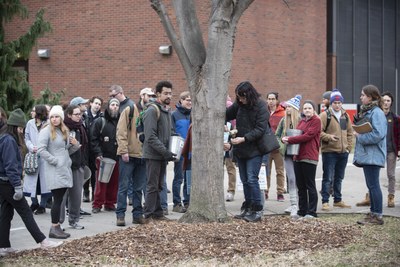 In 2020, the project was run by Garden Commons interns and volunteers who installed a dozen taps exclusively on maples around the Garden Commons, College of Education, and Davidson Hall at a January 17th Maple Tapping Workshop. At the end of the season, everyone was invited to learn more about the process while enjoying the fruits of the 2020 season at a February 16th Sugar Shack Open House (Making Maple Syrup w/UofL Sap), out at Urban Ducks Farm next to UofL's Shelby Campus. Unfortunately, due to the COVID-19 pandemic, we had to cancel our planned April 17th EcoReps Lunch & Learn: UofL Maple Tapping & Pancake Party!
In 2020, the project was run by Garden Commons interns and volunteers who installed a dozen taps exclusively on maples around the Garden Commons, College of Education, and Davidson Hall at a January 17th Maple Tapping Workshop. At the end of the season, everyone was invited to learn more about the process while enjoying the fruits of the 2020 season at a February 16th Sugar Shack Open House (Making Maple Syrup w/UofL Sap), out at Urban Ducks Farm next to UofL's Shelby Campus. Unfortunately, due to the COVID-19 pandemic, we had to cancel our planned April 17th EcoReps Lunch & Learn: UofL Maple Tapping & Pancake Party!
In 2019, the project was picked up as a component of a new SUST 480-01 course in Urban Agriculture taught by Urban & Public Affairs professor, Tamara Sluss. Public involvement remained strong as everyone was invited to the January 19th Garden Commons Maple Tapping Workshop led by our community partner, Dave Barker. The impact of the event was magnified by terrific local news coverage on WDRB (UofL students tap maple trees on campus for syrup), and professional photos produced by UofL's photographer. On Saturday, February 16th, the campus community was invited on a Sugar Shack Field Trip to Make Maple Syrup with the UofL sap out in Lyndon. It was a good year for sap production, as we collected about 1000 gallons out at Shelby campus and another 60 gallons on Belknap campus. At the end of the season, everyone was invited to learn more about the process while enjoying the fruits of the 2019 season at an April 19th EcoReps Lunch & Learn workshop: UofL Maple Tapping & Pancake Party!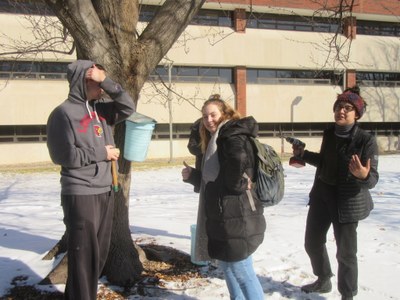 In 2018, the project evolved into an extracurricular Living Lab project for students, employees, and the public, in association with the UofL Garden Commons. The effort began on January 12, 2018 with a Maple Tapping Workshop at the Garden Commons, and continued with volunteers signing-up to monitor and empty sap buckets around campus. See Photos. Watch Video. On Feburary 3, 2018, our community partner in making maple syrup from UofL trees, Dave Barker, hosted an open house at his sugar shack for anyone interested in maple syrup production. UofL Biology Professor Linda Fuselier and several UofL students went on a field trip to see the syrup-making process in action. It was a very productive year and there was plenty of syrup produced for an April 13th EcoReps Lunch & Learn: Urban Forestry & Pancake Party with UofL Maple Syrup! Our community partner, Dave Barker, was able to produce 30 gallons of maple syrup thanks to 19 productive taps on Belknap and 120 taps on Shelby Campus.
In 2018, the project evolved into an extracurricular Living Lab project for students, employees, and the public, in association with the UofL Garden Commons. The effort began on January 12, 2018 with a Maple Tapping Workshop at the Garden Commons, and continued with volunteers signing-up to monitor and empty sap buckets around campus. See Photos. Watch Video. On Feburary 3, 2018, our community partner in making maple syrup from UofL trees, Dave Barker, hosted an open house at his sugar shack for anyone interested in maple syrup production. UofL Biology Professor Linda Fuselier and several UofL students went on a field trip to see the syrup-making process in action. It was a very productive year and there was plenty of syrup produced for an April 13th EcoReps Lunch & Learn: Urban Forestry & Pancake Party with UofL Maple Syrup! Our community partner, Dave Barker, was able to produce 30 gallons of maple syrup thanks to 19 productive taps on Belknap and 120 taps on Shelby Campus.
In 2017, the project expanded from one to two sections of BIOL 104, allowing for a doubling of the number of students involved and the number of trees tapped. TA Grace Freundlich taught both sections (with guidance from Biology professor Linda Fuselier). The Biology Department invested in its own tapping equipment and experimented with tapping other kinds of trees for sap. The syrup-making arrangement with our community partner, Dave Barker, was maintained and he oversaw the tapping of trees on UofL's Shelby Campus for the first time ever. A hands-on Maple Tapping Workshop for the whole campus community and general public was added (Feb. 13th, 2017, 1pm-2pm in Cultural Center Multipurpose Room & Garden Commons) as well as the EcoReps Lunch & Learn: Making Maple Syrup from UofL Trees (Pancake Party!) (Friday, April 21st, 2017 at Noon, Ekstrom Library 3rd Floor Delphi Lab). Photos. At UofL's Fall 2017 Farm-To-Table Dinner, an even wider audience was exposed to the project as the Sustainability Council's Inaugural Sustainability Award Honors Our Maple Maven, Dave Barker. Five things we learned about syrup during on-campus workshop (UofL News, Feb. 17, 2017)
Five things we learned about syrup during on-campus workshop (UofL News, Feb. 17, 2017) UofL’s campus serving as a sustainable living laboratory (UofL News, Feb. 3, 2017)
UofL’s campus serving as a sustainable living laboratory (UofL News, Feb. 3, 2017)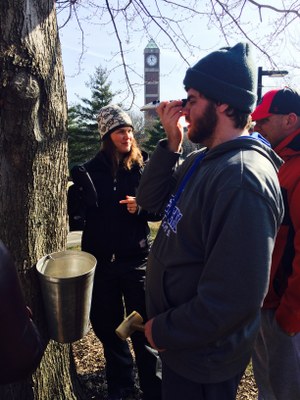 In 2016, 28 students were engaged in the project taught by CEHD PhD candidate Melissa Michael (with guidance from Biology professor Linda Fuselier). They tapped 12 maple trees (two sugar maples and ten red maples) from 2/18/16 – 3/11/16 on maples near the College of Education, the Interfaith Center, and Schneider Hall. The students split into seven groups to design experiments and gather data while collecting the sap. The sap was processed into 2 quarts of syrup by Dave Barker, a community-partner who operates an artisanal sugar shack in Lyndon. Students were invited to an optional field trip out to the sugar shack in March, and the project was shared with the larger campus community at the 4/15/16 EcoReps Lunch & Learn Workshop, which served as a Pancake Party for everyone to enjoy some of the UofL syrup! The project was also shared nationally with a poster presentation by Melissa Michael and Justin Mog at the 2016 conference of the Association for the Advancement of Sustainability in Higher Education (AASHE) in Baltimore: Sticky Sustainability: Tapping Untapped Resources on Campus #ULMapleMadness. Photos. Video.
In 2016, 28 students were engaged in the project taught by CEHD PhD candidate Melissa Michael (with guidance from Biology professor Linda Fuselier). They tapped 12 maple trees (two sugar maples and ten red maples) from 2/18/16 – 3/11/16 on maples near the College of Education, the Interfaith Center, and Schneider Hall. The students split into seven groups to design experiments and gather data while collecting the sap. The sap was processed into 2 quarts of syrup by Dave Barker, a community-partner who operates an artisanal sugar shack in Lyndon. Students were invited to an optional field trip out to the sugar shack in March, and the project was shared with the larger campus community at the 4/15/16 EcoReps Lunch & Learn Workshop, which served as a Pancake Party for everyone to enjoy some of the UofL syrup! The project was also shared nationally with a poster presentation by Melissa Michael and Justin Mog at the 2016 conference of the Association for the Advancement of Sustainability in Higher Education (AASHE) in Baltimore: Sticky Sustainability: Tapping Untapped Resources on Campus #ULMapleMadness. Photos. Video.
Maple tapping project a first for Belknap Campus trees (UofL News, April 25, 2016).
Melissa Michael describes class project to tap maple trees on campus for syrup (starts 23:08) (UofL Today with Mark Hebert, 93.9 FM The Ville, April 12, 2016). VIDEO (starts 20:08).
Unfortunately, the local effects of global climate destabilization have taken their toll on this Campus As A Living Lab opportunity. The unusually warm winter of 2017 demonstrated that it was simply too risky to keep this project as a part of a curriculum within a rigid academic calendar. In the end we learned that trees need to be tapped when the weather, not the academic calendar, permits. We are hoping to take this project out of the formal curriculum and into extracurricular life on campus. -
On-Going: Harriet A. Korfhage Native Plant Garden
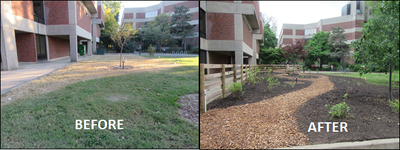 In Spring 2016, the Biology Department coordinated with the Grounds crew and Dropseed Nursery to remove an unused lawn area next to the Life Sciences building and replace it with a native plant living lab. The garden serves a number of our Biology labs by providing on-campus access to native plants as well as the insects such plants would attract. A number of our courses benefit from having such an area including Entomology (for the insects), Plant Taxonomy, Medicinal Plant Biochemistry, Ecology, and perhaps Animal Behavior. The garden also engages donors and participation from the Beechmont Garden Club as well as Botanica.
In Spring 2016, the Biology Department coordinated with the Grounds crew and Dropseed Nursery to remove an unused lawn area next to the Life Sciences building and replace it with a native plant living lab. The garden serves a number of our Biology labs by providing on-campus access to native plants as well as the insects such plants would attract. A number of our courses benefit from having such an area including Entomology (for the insects), Plant Taxonomy, Medicinal Plant Biochemistry, Ecology, and perhaps Animal Behavior. The garden also engages donors and participation from the Beechmont Garden Club as well as Botanica. -
On-Going: Longitudinal UofL Commuter Survey
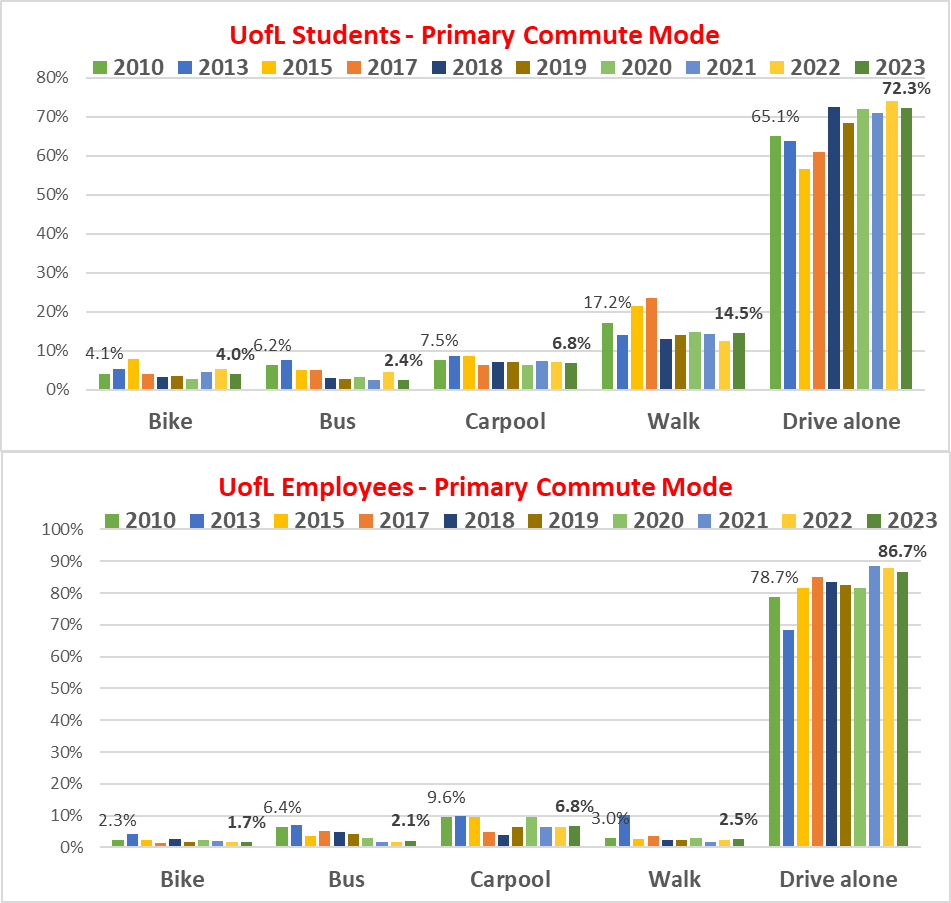 Since 2010, graduate students and faculty in the Department of Urban & Public Affairs have collaborated with staff from Sustainability (Provost's Office), Institutional Research, and Parking and Transportation Services to design and implement an on-going longitudinal study of the commuting habits and attitudes of UofL students, faculty and staff. Students in Professor John Gilderbloom's spring 2010 course UPA 680-01 URBAN RESEARCH SEMINAR were involved in designing and pre-testing the initial survey instrument administered by Institutional Research. Questions explored not only commuting habits by demographics, but willingness to consider alternative modes and barriers to their use. Graduate students took the lead in analyzing the resulting data which was used to set a baseline for the Sustainability Council's effort to document greenhouse gas emissions and to develop a plan to reduce vehicle miles traveled to campus. In fall 2012, the Sustainability Council launched a full suite of transportation alternatives (free bikeshare, Earn-A-Bike, carpool matching, and carshare in addition to free transit). The impact of these new programs was assessed by a follow-up survey conducted in spring 2013. This survey was also a collaboration between staff in university administration and Urban & Public Affairs professor Frank Goetzke (serving as Principle Investigator) and graduate research assistants who again helped revise and pre-test the survey instrument and analyze the data. A third follow-up survey in the longitudinal study was conducted in fall 2015, with Urban & Public Affairs professor Dave Simpson serving as Principle Investigator and graduate research assistants again involved in revising and pre-test the survey instrument and analyzing the data. In 2019-20, Sustainability Masters student, Tom Sommers, produced an analysis of our 2010-2019 UofL Commuter Surveys, linking the results to carbon emissions and local air quality and doing an analysis of the reliability of self-reported commute distances in which it was discovered that faculty are the least accurate in estimating their commute distance and students are the best. This longitudinal study has been pivotal to informing the Sustainability Council's on-going work to provide a full suite of transportation alternatives that meet the needs of our evolving campus population.
Since 2010, graduate students and faculty in the Department of Urban & Public Affairs have collaborated with staff from Sustainability (Provost's Office), Institutional Research, and Parking and Transportation Services to design and implement an on-going longitudinal study of the commuting habits and attitudes of UofL students, faculty and staff. Students in Professor John Gilderbloom's spring 2010 course UPA 680-01 URBAN RESEARCH SEMINAR were involved in designing and pre-testing the initial survey instrument administered by Institutional Research. Questions explored not only commuting habits by demographics, but willingness to consider alternative modes and barriers to their use. Graduate students took the lead in analyzing the resulting data which was used to set a baseline for the Sustainability Council's effort to document greenhouse gas emissions and to develop a plan to reduce vehicle miles traveled to campus. In fall 2012, the Sustainability Council launched a full suite of transportation alternatives (free bikeshare, Earn-A-Bike, carpool matching, and carshare in addition to free transit). The impact of these new programs was assessed by a follow-up survey conducted in spring 2013. This survey was also a collaboration between staff in university administration and Urban & Public Affairs professor Frank Goetzke (serving as Principle Investigator) and graduate research assistants who again helped revise and pre-test the survey instrument and analyze the data. A third follow-up survey in the longitudinal study was conducted in fall 2015, with Urban & Public Affairs professor Dave Simpson serving as Principle Investigator and graduate research assistants again involved in revising and pre-test the survey instrument and analyzing the data. In 2019-20, Sustainability Masters student, Tom Sommers, produced an analysis of our 2010-2019 UofL Commuter Surveys, linking the results to carbon emissions and local air quality and doing an analysis of the reliability of self-reported commute distances in which it was discovered that faculty are the least accurate in estimating their commute distance and students are the best. This longitudinal study has been pivotal to informing the Sustainability Council's on-going work to provide a full suite of transportation alternatives that meet the needs of our evolving campus population. -
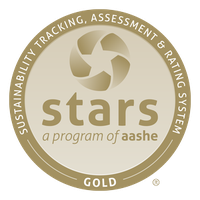 On-Going: Sustainability Tracking, Assessment & Rating System
On-Going: Sustainability Tracking, Assessment & Rating System
UofL uses the comprehensive Sustainability Tracking, Assessment & Rating System (STARS) developed by the Association for the Advancement of Sustainability in Higher Education (AASHE) to measure our progress in sustainability and to do strategic planning around how to improve our environmental, social, and economic stewardship. There is a considerable amount of data-gathering and analysis required to prepare a STARS report. It is a year-long process that we go through every three years and we strive to make it an educational campus as a living lab experience by involving student researchers. For the 2016, 2019, and 2022 STARS reports, UofL's Sustainability Council hired student interns (some of whom were concurrently enrolled in academic internship/practicum courses) to assist with the year-long data-gathering and analysis. Students on the Sustainability Council have also assisted in the strategic planning for sustainability that results from each STARS report. -
On-Going: Passive Solar Test Facility
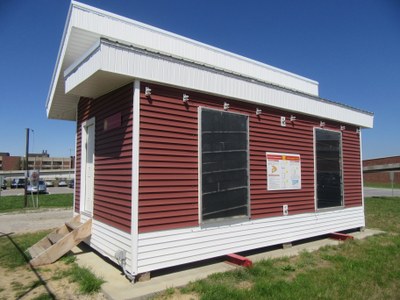 We are investigating renewable energy options to passively heat & cool UofL buildings. At Burhans Hall on our Shelby campus, in collaboration with the Department of Energy and the Kentucky Renewable Energy Consortium, UofL's Renewable Energy Applications Laboratory (REAL) installed an experimental solar heat pipe wall for indoor climate control that may prove to be twice as efficient as other solar systems in places such as Louisville with moderate sun and cold winters. In 2011, the system was moved for further experimentation and monitoring to a newPassive Solar Test Facility constructed at the Speed School of Engineering at the Brook Street railroad fly-over, just south of Eastern Pkwy. This is the only such device of its kind in the world. The walls, floor and roof are built with structural insulated panels (SIP’s). The building is divided into two rooms with an insulated interior wall to allow side-by-side testing of two systems. Currently installed are two solar heat pipe systems, which produce net heat gains approximately twice as large as typical direct gain systems. Heating performance of these two prototypes has been compared, and strategies for reducing unwanted gains during the summer have also been tested. These experiments were funded by the Department of Energy, and are reported in the following articles:
We are investigating renewable energy options to passively heat & cool UofL buildings. At Burhans Hall on our Shelby campus, in collaboration with the Department of Energy and the Kentucky Renewable Energy Consortium, UofL's Renewable Energy Applications Laboratory (REAL) installed an experimental solar heat pipe wall for indoor climate control that may prove to be twice as efficient as other solar systems in places such as Louisville with moderate sun and cold winters. In 2011, the system was moved for further experimentation and monitoring to a newPassive Solar Test Facility constructed at the Speed School of Engineering at the Brook Street railroad fly-over, just south of Eastern Pkwy. This is the only such device of its kind in the world. The walls, floor and roof are built with structural insulated panels (SIP’s). The building is divided into two rooms with an insulated interior wall to allow side-by-side testing of two systems. Currently installed are two solar heat pipe systems, which produce net heat gains approximately twice as large as typical direct gain systems. Heating performance of these two prototypes has been compared, and strategies for reducing unwanted gains during the summer have also been tested. These experiments were funded by the Department of Energy, and are reported in the following articles:
1. Robinson BS & Sharp MK, “Reducing unwanted gains during the cooling season for a solar heat pipe system,” Solar Energy 115:16-32, 2015.
2. Robinson BS & Sharp MK, “Heating season performance improvements for a solar heat pipe system,” Solar Energy 110:39-49, 2014.
3. Robinson BS, Chmielewski NE, Knox Kelecy A, Brehob EG, Sharp MK, “Heating season performance of a full-scale heat pipe assisted solar wall,” Solar Energy 87:76–83, 2013. -
On-Going: Sustainability Living-Learning Community
In Fall 2018, UofL launched this new on-campus community to provide students interested in sustainability and sustainable living with the opportunity to deepen their understanding of the principles and practice of sustainability, while developing skills, leadership, and a community of support. Participants in this immersive LLC live together, take classes together, and take action together. They participate in campus sustainability programming and service projects. As sustainability is an inherently transdisciplinary pursuit, participants from any major are welcome. You do not have to be pursuing a degree in Sustainability to live in this community, but participants will be exposed to this new major as an option. Full details and application here.
-
On-Going: Certificate in Diversity Literacy
The Certificate in Diversity Literacy provides a unique opportunity for students who have already earned bachelor’s degrees to enhance their knowledge and skills of the theory and practice of inclusion and equity, including what diversity means, what its personal and social effects are, and how it shapes lives, workplaces, and pedagogy. All students in the program are required to complete a Capstone in Diversity Literacy course in which students must conceive and develop a culminating project that advances diversity in each student's chosen field. -
On-Going: Office of Health Promotion
The mission of UofL's Office of Health Promotion is to collaborate to build a campus community that promotes vitality, resilience, health and academic excellence. To achieve this goal, the Office employs professional and student staff as well as volunteers and interns in order to provide relevant, accurate and non-judgmental programs services, advocacy, peer mentorship and increased access to health-promoting options. The Office takes a data-driven approach to improving public health on campus and is constantly innovating, studying and evaluating the impact of interventions and campaigns. The Office works in close collaboration with the UofL Sustainability Council and the Get Healthy Now employee wellness program. -
On-Going: The Phoenix House
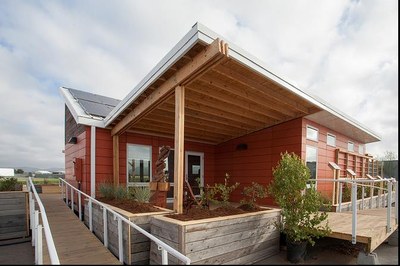 UofL Civil Engineering professor W. Mark McGinley, who led the University of Louisville/Ball State University team for the 2013 Department of Energy Solar Decathlon competition, has involved his team of students, staff, and faculty in reconfiguring the student-built “Phoenix House” into the new administrative offices for UofL's Conn Center for Renewable Energy Research. The Phoenix House serves as a living laboratory for projects on solar, energy storage, geothermal systems, and building envelope studies to continually develop data toward smart and energy efficient homes.
UofL Civil Engineering professor W. Mark McGinley, who led the University of Louisville/Ball State University team for the 2013 Department of Energy Solar Decathlon competition, has involved his team of students, staff, and faculty in reconfiguring the student-built “Phoenix House” into the new administrative offices for UofL's Conn Center for Renewable Energy Research. The Phoenix House serves as a living laboratory for projects on solar, energy storage, geothermal systems, and building envelope studies to continually develop data toward smart and energy efficient homes. -
On-Going: Ali Scholars
The Ali Scholars Program, offered to full-time undergraduate University of Louisville students, is a unique multi-year experience combining training, research and service in the areas of violence prevention, social justice and peacemaking in an urban living context. A special emphasis is placed on understanding and addressing the social conditions that impact those issues. Through their work with UofL's Muhammad Ali Institute, Ali Scholars develop expertise on a topic of their choice by participating in seminars with renowned practitioners, educators and activists. The Ali Scholars employ a practical solution-based approach as they produce scholarly research related to their “expert area” and its impact locally and globally. Equipped with a solid knowledge base and organizing skills, the Ali Scholars provide service hosting on-campus events, furthering the work of the Ali Institute and working alongside campus, local, national and international practitioners in their expert areas. Through the Ali Scholars program, students acquire both the intellectual and practical training to take action and leadership on issues of peace, violence prevention and social justice at home and abroad. Ali Scholars are expected to provide service to campus, local, national or international organizations and efforts related to peace and social justice. -
On-Going: Translating Social Justice Research Into Action
In Fall 2014, UofL's Muhammad Ali Institute for Peace and Justice issued a university-wide call for faculty collaboration to identify new and innovative ways of connecting research to the community. We call this effort “Translating Social Justice Research Into Action.” Two projects emerged from this effort. The first is the “Cultural Competency Project” representing the work of a multidisciplinary faculty research group organized and supported by Ali Institute. This Faculty Research Group is assessing the content and operationalization of “cultural competency” across disciplines, professions and operations in a university setting. The Faculty Research Group is supported by the Muhammad Ali Institute Law Fellow - Mashayla Hays. A second project focuses on faculty at the University who are engaged in social justice research. “Faculty Spotlights” highlight social justice research at the University of Louisville and key insights that may be of particular interest to local community and government organizations, as well as national and international groups. The first spotlight was on Dr. Aaron Rollins, Assistant Professor of Urban & Public Affairs.
The Faculty Research Group includes:
- Meera Alagaraja, Educational Leadership, Evaluation and Organizational Development, CEHD
- Latrica Best, Pan-African Studies, A&S
- Cherie Dawson-Edwards, Criminal Justice, A&S
- Tia Dumas, Assistant Dean of the Graduate School, Clemson University
- Yvonne Jones, Pan-African Studies, A&S
- Cedric Powell, Law
- Aaron Rollins, Urban & Public Affairs, A&S
- Terri Rowland, Educational Leadership, Evaluation and Organizational Development, CEHD
- Shelley Thomas, Middle and Secondary Education, CEHD
- Enid Trucios-Haynes, Law
- Sherri Wallace, Political Science, A&S -
On-Going: Dual-Axis Tracking Solar Array
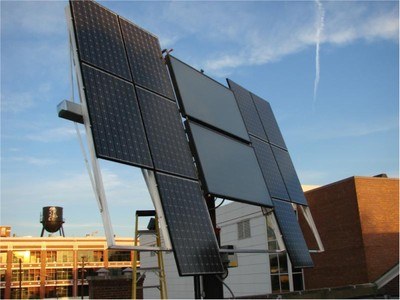 The computer controlled dual-axis tracking solar array on Sackett Hall at the J.B. Speed School of Engineering produces both electricity (2 kW) and hot water for the building. It is the only such tracking array in Kentucky, and is intended for research, development and education, while supplying a portion of the building's electricity and hot water. Because it is able to track the sun precisely throughout the day and across the seasons, it is 30% more efficient than fixed solar panels. The two solar thermal collectors in the center of the array provide nearly 100% of the building's hot water in the summer, and ten photovoltaic panels feed enough electricity into the grid to power the building's computer laboratory. Real-time data on how much energy the system is capturing is available on a monitor inside the building.
The computer controlled dual-axis tracking solar array on Sackett Hall at the J.B. Speed School of Engineering produces both electricity (2 kW) and hot water for the building. It is the only such tracking array in Kentucky, and is intended for research, development and education, while supplying a portion of the building's electricity and hot water. Because it is able to track the sun precisely throughout the day and across the seasons, it is 30% more efficient than fixed solar panels. The two solar thermal collectors in the center of the array provide nearly 100% of the building's hot water in the summer, and ten photovoltaic panels feed enough electricity into the grid to power the building's computer laboratory. Real-time data on how much energy the system is capturing is available on a monitor inside the building. -
On-Going: Get Healthy Now
UofL's employee wellness program, Get Healthy Now, offers students a variety of opportunities to use the campus population as a living laboratory for improving health and wellness. Through the program, students can enjoy an enriched academic experience while applying classroom knowledge in the real-world. Students are given hands-on opportunities to perform health and fitness assessments, develop health education programming, wellness coach, and create marketing materials. Participants gain practical and professional experience while networking with others in the field through: Wellness Coaching Internships and Externships; and Fitness Facility Internships; an Interdisciplinary Wellness Coaching Minor; and a Federal Work Study Program. -
On-Going: Anne Braden Institute for Social Justice Research
UofL's Anne Braden Institute for Social Justice Research was founded in 2006 to honor the work and legacy of longtime racial justice organizer, educator and journalist Anne Braden. The Institute seeks to advance public understanding of the U.S. civil rights movement, both its powerful history and its unfinished agenda of racial and social justice. Our vision is that scholarship and activism inform and strengthen each other and sustain social justice locally, regionally, nationally and globally. Our mission is to bridge the gap between academic research and community activism for racial and social justice. To do so, we stimulate and support initiatives and programs that cultivate dialogue and cooperation between scholarship and activism. We focus on the modern African American freedom movement, other modern peace and social justice movements, and the intersections among racial, economic, gender, and wider social justice. Because the Institute’s work grows out of U.S. history, with its legacy of white supremacy, we see race/racism as central elements in all aspects of social justice in the United States. Our work aims at uncovering those connections and at the successful bridging of racial divides, with a special focus on the Louisville community and the U.S. South. -
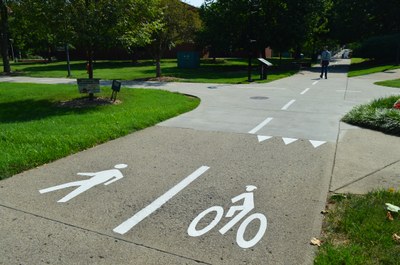 Spring 2016: Bike/Walk Lane Awareness Project
Spring 2016: Bike/Walk Lane Awareness Project
For his practicum project, Corey Scott, a second year graduate student in the Communications Masters Program, took on the UofL Sustainability Council as a client and surveyed 219 students about their attitudes, norms, perceived behavioral control, and behavioral intention with respect to bike/walk lanes on and around campus. The project gauged student’s awareness and opinion about the lanes we have and their intentions and desires to use them properly. Designated lanes both on campus paths and on surrounding streets were found to be of value, safe, and desirable for both pedestrians and cyclists. The study documented a strong desire to see more designated lanes installed on more paths and streets around campus. Additional recommendations from the study included implementing a communication campaign to influence attitudes about the lanes (e.g. “The safest path to success!”) and to provide confidence-building tips and training for cyclists (especially older riders) about using the streets safely. The project was advised by Communication Professors Lindsay Della & Jasmine Wang. -
Summer/Fall 2015: Biological Processes of Campus Composting
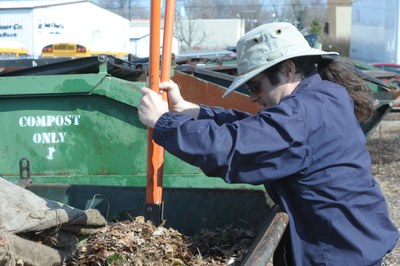 33 non-science-major students in a new Sustainable Community Engagement section of BIOL 104 - Laboratory for Introduction to Biological Systems run by Professor Linda Fuselier used the university’s Community Composting operations as an opportunity to study the biological processes of decomposition and factors associated with successful composting operations for organic waste streams from the campus and surrounding partners. Since July 2010, volunteers have been collecting food wastes for on-campus composting from some UofL Dining Service outlets, area coffee shops, residence halls, and other community sources, but this was the first time that the operation was used as a living lab for a class research project. Students were divided into small groups, each of which designed different experiments associated with various stages of the composting process from leaf litter piles to primary food waste composting bins to vermiculture bins to finished compost used as organic fertilizer in the campus’ Garden Commons raised beds.
33 non-science-major students in a new Sustainable Community Engagement section of BIOL 104 - Laboratory for Introduction to Biological Systems run by Professor Linda Fuselier used the university’s Community Composting operations as an opportunity to study the biological processes of decomposition and factors associated with successful composting operations for organic waste streams from the campus and surrounding partners. Since July 2010, volunteers have been collecting food wastes for on-campus composting from some UofL Dining Service outlets, area coffee shops, residence halls, and other community sources, but this was the first time that the operation was used as a living lab for a class research project. Students were divided into small groups, each of which designed different experiments associated with various stages of the composting process from leaf litter piles to primary food waste composting bins to vermiculture bins to finished compost used as organic fertilizer in the campus’ Garden Commons raised beds. -
2014-15: Student Recommendations for Improving Local Transit
- FALL 2015: UPA 680-76 Special Topics: Sustainable Social-Ecological Systems (Professor Daniel DeCaro)
At the request of TARC (Transit Authority of River City), UofL students worked on a group final project to produce recommendations for improving local transit with a final presentation, 30-page report and discussion with TARC staff. Report: Social Sustainability Guidelines and Metrics for Transportation in Louisville: A Proposal for TARC's APTA Sustainability Commitment
Authors: Ariel E. Weaver, Peter Williams, Nathan Wright, Ashley Woolsey, and Erin Yenney
- SPRING 2015: UPA 680-75 Special Topics: Behavior & Environmental Sustainability (Professor Daniel DeCaro)
Students collaborated to present their ideas about how to promote mass transit ridership among people working in downtown Louisville to TARC and UofL Sustainability Council reps.
- FALL 2014: UPA 680-75 Special Topics: Urban Environments and Sustainability (Professor Daniel DeCaro)
Graduate students worked together throughout the semester to understand the factors that may be shaping use of alternative transportation in Louisville, and they also worked to create a survey that may be used (e.g., by the Partnership for a Green City and/or UofL's Sustainability Council) to assess psychological and social-ecological barriers to alternative transportation use.
- SPRING 2014: UPA 680-75 Special Topics: Behavioral Dimensions in Urban Sustainability (Professor Daniel DeCaro)
Students identified improving ridership of TARC as their course project and produced a final report and presentation for the UofL Sustainability Council. -
Fall 2013: Real Food Challenge
Students in Anthropology Professor Jeneen Wiche's ANTH 352 - Food & Body Politic class explored the emerging campaign of the Real Food Challenge and its applicability to UofL. The students were instrumental in getting UofL to sign onto the Real Food Challenge that semester. In spring 2014, the Antropology Department sponsored an independent study course in which students worked with Professor Wiche and UofL Dining Services staff to conduct the university’s first audit using the Real Food Challenge calculator. It was decided to audit Dining Services food procurement for the months of September 2013 and February 2014 so as to capture one month in which it is relatively easy to buy local and one month with less local food availability. Food procurement invoices were gathered for select dining facilities (Cardinal Burger Company, The Ville Grill, and Garden Toss) and students got hands-on learning experience in the process of entering the line-items of food into the RFC calculator. Once the information is entered, students did research to evaluate what qualifies as “real food” based on the national criteria, including terms such as real, humane, local, sustainable, worker friendly, etc. In addition, students took two field trips to explore the local food system: a tour of Creation Gardens at the produce terminal in Louisville and another at Gallrein Farm in Bagdad, KY. This campus as a living lab initiative got the university started on an on-going process of transforming Dining Services procurement to be better aligned with the goals of the Real Food Challenge. In the 2015-16 academic year, the on-campus Real Food Challenge has taken on a more student-led approach, including demands for more stringent sustainable procurement and living wage requirements in the new Dining Services contract that the university is currently negotiating. -
2011: Storm Water Management - Infiltration Study
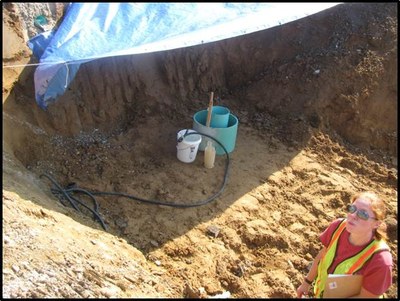 When UofL launched an extensive initiative in partnership with Louisville’s Metropolitan Sewer District to install new storm water management systems in 2011, it did so with an important campus as a living lab component. Student, faculty, and staff researchers from UofL's Center for Infrastructure Research installed monitoring equipment to study infiltration rates, storage capacity, and the performance of various infiltration basin designs on Belknap campus. Many traditional-looking parking lots, plazas and lawns across campus now conceal advanced storm water infiltration systems. Instead of draining to the combined sewer system, these areas drain to large underground infiltration basins capable of handling huge rainfall events and the water from surrounding rooftops. These designs were included in the following projects (with the square footage of impervious surface area mitigated in parentheses):
When UofL launched an extensive initiative in partnership with Louisville’s Metropolitan Sewer District to install new storm water management systems in 2011, it did so with an important campus as a living lab component. Student, faculty, and staff researchers from UofL's Center for Infrastructure Research installed monitoring equipment to study infiltration rates, storage capacity, and the performance of various infiltration basin designs on Belknap campus. Many traditional-looking parking lots, plazas and lawns across campus now conceal advanced storm water infiltration systems. Instead of draining to the combined sewer system, these areas drain to large underground infiltration basins capable of handling huge rainfall events and the water from surrounding rooftops. These designs were included in the following projects (with the square footage of impervious surface area mitigated in parentheses):
1. Ekstrom Library western lawn - completed in fall 2012, this infiltration system captures roof run-off from surrounding buildings (108,000 sf)
2. The UTA/Ville Grill plaza renovated in 2011. (14,550 sf)
3. The Red Barn plaza renovated in 2011. (4,120 sf)
4. The Grawemeyer Oval lawn renovated in 2011. (76,368 sf)
5. The College of Business parking lot renovated in 2011. (86,052 sf)
6. The parking lot behind Bettie Johnson Hall, the Urban Studies Institute, and University Planning, Design & Construction renovated in 2011. (67,629 sf)
7. The Speed Museum expansion project has been designed with a large infiltration basin beneath the plaza which will be able to handle roof drainage from Strickler Hall, Life Sciences, and the College of Business. (94,304 sf)
8. The new Student Recreation Center opened in October 2013 with an infiltration system that is larger than originally planned. It has a connected load that captures rainwater from most of the land surrounding Billy Minardi Hall as well. (317,115 sf).



